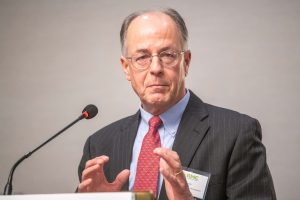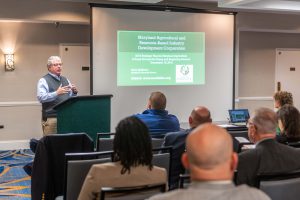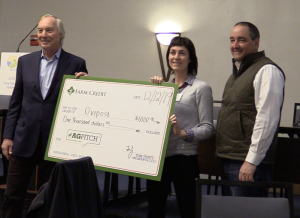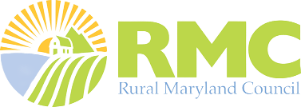Summit caps off a year of achievements: Rural Maryland Council enters 2020 re-energized & prepared to champion quality of life issues
Enhancing quality of life is a goal that’s at the heart of most policymaking regardless of whether you are working from a community or town, county, state or national perspective. for most stakeholders identifying the problems is the easy part. Finding solutions, however, is a whole other story often laden with intertwining issues like funding and who can or should manage the process.
When the Rural Maryland Council (RMC) hosted its recent Summit this concept of how to create sustainably the change was front and center as leaders from throughout the state provided examples of how they were championing solutions in their communities for complex issues in agriculture, aquaculture, and forestry as well as health care, community development, and economic development. The day-long Summit, titled Rural Maryland Rising: Investing in Resiliency, Collaboration, and Innovation, and RMC’s Annual Meeting which was held the evening before attracted nearly 300 rural residents, business owners, community leaders, and legislators from across the state.

Paul Costello, Ph.D., executive director of the Vermont Council on Rural Development, gives his keynote address at Rural Maryland Rising: Investing in Resiliency, Collaboration, and Innovation, a Summit hosted by the Rural Maryland Council. Photo by EdwinRemsberg/Remsberg.com
Keynote speaker, Paul Costello, Ph.D., executive director of the Vermont Council on Rural Development, set the tone for the Summit. “In the face of our rural challenges, to build unity and momentum to get things done, we need to carry relentless optimism, ” says Dr. Costello. “Let’s stop defining rural as a failure and as a deficit. Let’s define it by its strengths and its critical importance to the future, and let’s work together for a New Ruralism, a renewal and re-engagement with all the creative forces for good in rural communities,” he adds.
For Charlotte Davis, Dr. Costello’s remarks couldn’t have been more on point. “All too often when we are working in our communities we get too focused on identifying the problems. But when we get together to discuss the challenges, develop proactive solutions, and identify ways to implement those solutions that are when real, sustainable change happens,” Davis says. “Through events like the Summit, we can come together to share doable solutions. This brand of proactive problem-solving has really gotten the attention of our Maryland legislators,” she adds.

Steve McHenry, executive director of MARBIDCO, speaks during a breakout session on the statewide Strategic Plan for Maryland Agriculture. Photo by EdwinRemsberg/Remsberg.com
The Summit included breakout sessions, a 2020 session preview with Maryland legislators, and a luncheon panel session with Maryland cabinet secretaries and department leadership. The Summit also included a welcome by Maryland Lieutenant Governor Boyd Rutherford and AgShowcase19, featuring four agricultural innovators who presented a TED-styled talk about how they are changing the face of agriculture in Maryland (and around the country).
Sponsored by the MidAtlantic Farm Credit, the session featured live, online audience voting/participation to determine award amounts for the presenters based on criteria such as relevance and innovation. The AgShowcase19 first place winner is Ovipost of Cordova, which automates cricket farming to helo insects become an affordable, scalable, sustainable, high-protein ingredient for broad use throughout the agricultural supply chain. Tied for second place are:
- MadTech Modern Agronomy of Huntingtown, last year’s AgPitch winner, which uses agricultural drones to give
farmers comprehensive and detailed information about their crops. - Mercaris of Silver Spring, which provides up-to-date, accurate information on market conditions for organic and
non-GMO commodities as well as a trading platform for buyers and sellers. - Terrapulse of College Park, which uses satellite imagery to provide public and private sector clients with real-time
data to map and monitor land and how it changes over time. - The Honorable Peter Franchot, Comptroller of Maryland, did the official check presentation to the AgShowcase19 winners and closed out the Summit with brief remarks.
The Summit capped off a year filled with many achievements for the Rural Maryland Council. Among the more
significant achievements are:
- Clearing the path for last-mile broadband installation by supporting laws that allow electric cooperatives to utilize
rights-of-way to be used for broadband. - Completing a report on agricultural education to address the shortage of skilled agricultural workers by ensuring
those students are educated about agricultural career opportunities in much the same way they are presented with
vocational and college career opportunities. - Providing $2.055 million in economic development support through the Rural Maryland Prosperity Investment
Fund (RIMPIF) to the state’s five regional councils to be used to build capacity to support projects as well as an
an additional $3.92 million to fund grant projects focused on entrepreneurship, health care, and infrastructure. - Providing $1.027 million to fund 37 projects through the Maryland Agricultural Education and Rural
Development Assistance Fund (MAERDAF).

The 2019 winner at the AgShowcase19 was Ovipost of Cordova. Accepting the check from Maryland Comptroller Peter Franchot, left, and Thomas H. Truitt, Jr., president and chief executive officer of MidAtlantic Farm Credit, right, is Trina Chiasson, co-founder and chief executive officer at Ovipost. Photo by MidAtlantic Farm Credit
“Although we are humbled by the number of benchmarks and successes that RMC and our partners have achieved in 2019, we still have a lot of heady projects to tackle,” says Davis. “We must continue to work on issues like broadband so that our rural communities can equitably compete in a global economy. The balancing act between respecting and honoring our heritage to the land while implementing real change for a sustainable future will continue and we need everyone at the table to do this important work,” she adds.
Upcoming RMC events include the welcome breakfast for legislators on January 17, the legislative luncheon on January 31 and Rural Maryland Day on February 4. Stay tuned for the new Rural Maryland aspirations video, which will be released in early January.
Founded in 1994, the Rural Maryland Council operates under the direction of a 40-member executive board in a nonpartisan and nondiscriminatory manner. It serves as the state’s federally designated rural development council and functions as a voice for rural Maryland, advocating for and helping rural communities and businesses across the state to flourish and to gain equity to its suburban and urban counterparts. For more information, visit https://rural.maryland.gov or call (410) 841-5772, email [email protected]. For updates on all RMC events and activities connect with the Rural Maryland Council at facebook.com/RuralMaryland or on Twitter @RuralMaryland.
